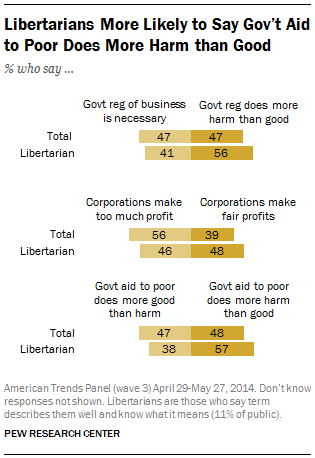A surge of small-government hawks have taken center stage in the 2016 presidential election, proudly touting their commitment to the principle of liberty. The likelihood that a self-described libertarian—Rand Paul, Ted Cruz, or Marco Rubio—will become the president of the United States is directly proportional to the number of Americans that identify with their principles.
This begs the question: Who are libertarians, and what do they actually believe?
POLITICAL BELIEFS AND DEMOGRAPHICS

About 11 percent of the American public is libertarian, according to a 2014 study by the Pew Research Center, and men are twice as likely to be libertarian as women (15 percent vs. seven percent). The Pew survey also found that libertarians are typically higher-income, well-educated, and identify as being politically independent.
Self-described libertarians aren’t actually all that different from the American public. On government regulation—libertarians’ key issue—they are only 10 points more likely (56 percent) to say that “government regulation does more than good.” Similarly, there’s only about a 10-point delta on beliefs about the fairness of corporate profits and the efficacy of government aid.
Overall, libertarians are very socially liberal. Seventy-seven percent believe homosexuality should “usually” be acceptable, and 47 percent favor abortion rights. They’re also big civil liberties advocates: Only 46 percent support police stop-and-frisk policies.
But, as the New York Times points out, libertarians tend to align with Republicans on personal responsibility, including a belief that African Americans are responsible for their own condition (80 percent) and low support for gun control (25 percent).
On the other hand, FiveThirtyEight’s Nate Silver recently argued that while few conservatives call themselves libertarian, there are many Americans who hold libertarian-leaning beliefs. In particular, Silver notes that 22 percent of the American public favors gay marriage and opposes income redistribution.
It may take a popular libertarian candidate to see whether people’s beliefs matter more than their self-professed identifies.
THE MORAL SOUL OF A LIBERTARIAN
In a large scale 2012 study on moral beliefs, a team of researchers quizzed libertarians on everything from opposition to authority, to fairness and relativism. The researchers found that, generally speaking, libertarians have consistent beliefs with their public stereotype.
Libertarians scored very similar to conservatives on fairness values; they tend to believe that folks are responsible for themselves. On the other hand, libertarians did not share their fellow Republicans’ belief that one should respect authority for the sake of authority. In other words, they’ve got that patented conservative “maverick” streak.
Similarly, libertarians tend toward relativism: Most don’t like the idea of a universal good, or an obligation to take care of others.
“Libertarians value self-direction and liberty more than other groups,” says Ravi Iyer, a co-author of the study and data scientist at Ranker.com. “While at the same time placing less emphasis on the values that liberals tend to emphasize (e.g. social justice, caring for the less fortunate) and the values that conservatives tend to emphasize (e.g. being loyal to one’s group and respecting authority/tradition/religion).”
In other words, libertarians are, generally speaking, rabid individualists.
Now, it’s still an open question as to whether the Republican party has moved toward libertarian principles. We’ll have to wait until 2016 to really find that out.





